Organic farming ensures that nature stays clean and rich. If we visit an organic farm, we will notice a buzz of animal, bird, and insect activity. Research shows that around 30 percent more wildlife and plants near ecological production fields than conventional farming. This is because there are no pesticides, and fertilizer is used far less.
The covid-19 pandemic has changed the perception of organic food, with the spotlight now on safety and healthy food that is nutritious to build a strong immune system. It is time to talk about nutritional security, not food security only (which consists of only carbohydrates). Organic food is perceived as the preferred choice among the host of healthy food options available.
Therefore, organic food has witnessed an uptake since the onset of the pandemic. This is because organically grown foods generally contain higher levels of antioxidants, certain micronutrients, no harmful chemicals, pesticides, and fertilizers, and better taste. The most important thing is that organically grown produce aids the planet’s sustainability and ecological balance.
Tamilnadu organic farming
Soils in Tamilnadu suit for organic farming
- Tamil Nadu has the highest concentration of black cotton soil.
- There are various soil types in Tamil Nadu, including red loam, laterite, black soil, alluvial soil, and saline soil.
- There is a large area of red soil in Tamil Nadu, especially in the interior districts like the coastal ones. As part of Tamil Nadu, red soil is found in Kancheepuram, Coimbatore, Trichy, Pudukkottai, Thanjavur, Sivaganga, Cuddalore, Vellore Salem, Dharmapuri, Ramanathapuram, Virudunagar, Madurai, Dindigul, Nagapattinam, Thoothukudi, Tirunelveli, and the Nilgiris.
- A laterite clay is a smooth, red brick with a small amount of titanium. Kancheepuram, Thanjavur, Nagapattinam, and Nilgiris are the places where it is found.
- In areas with poor drainage and high evaporation, sandy or saline soils are found. All districts in Tamil Nadu except Kanyakumari and Nilgiris have these.
Tamil Nadu’s Erode district was carefully selected since it is home to 65% of the state’s organic turmeric and cotton plantations. A purposeful selection of the Anthiyur block was made in the second phase since it occupied 76% of the organic turmeric and cotton areas in the Erode district.
The villages cultivating more than 75% of the organic turmeric and cotton in Anthiur block are considered the total area under organic turmeric and cotton. First, Poiyankuttai, Adireddiyur, Perumapalayam, Pudukadu, and Esaparai were identified as villages in Tamil Nadu. Then, two villages were randomly selected from the identified villages, Poyankotai and Padukado.
Composting should be promoted through vermicomposting, green manure, etc., to restore soil health. The soil is the backbone of organic farming systems, so newcomers must understand the characteristics and limitations of the soil on their farms. Fertility levels, drainage, organic matter, pH levels, physical health, legume content, and pest pressure are excellent assets. It is common for these fields to be prepared in advance for transition and certification.
Major crops in Tamilnadu
Plantation crops are grown extensively in large contiguous areas, and the product can be utilized only after processing. In Tamilnadu, major plantation crops are Cashew, Coffee, Tea, Rubber, Betel vine, Areca nut, Coconut, Bamboo, and Cocoa. Cashew is the ‘Gold mine’ of wasteland grown in almost all kinds of soil.
In case you missed it: Onion Farming in Tamilnadu: A Helpful Production Guide for Beginners

It is presumed that Cashew was originally introduced into India from Brazil in the sixteenth century mainly for checking soil erosion on the coast. The major cashew-growing districts are Ariyalur, Cuddalore, Pudukkottai, Theni, Villupuram, and Sivagangai. Tea was first introduced in the Nilgiris from Assam in 1839 and was commercially cultivated from 1853. It is predominantly grown on hill slopes in Coimbatore and The Nilgiris Districts.
Coffee is grown on hill slopes of Dindigul, The Nilgris, Salem, Theni, and Coimbatore districts. Rubber is exclusively cultivated in the High Rainfall zones of Kanniyakumari. Bamboo and cocoa were cultivated in Tamil Nadu after introducing the National Bamboo Mission and National Horticulture Mission Programmes.
Most plantation crops are promoted through several Boards established by the Government of India. The Central Plantation Crops Research Institute (CPCRI) is researching these crops. Tea Board of India, Coffee Board of India, and Rubber Board, which are functioning under the Ministry of Commerce and Industry, Directorate of Cashew nut and Cocoa Development, are the agencies involved in developing these crops in Tamil Nadu.
| Name of the Crop | Area (acre) | Major Growing Districts |
| Coconut | 10,94,888 | Coimbatore Thiruppur Thanjavur Dindigul Kanyakumari Theni |
| Cashew nut | 2,25,824 | Ariyalur Cuddalore Villupuram Pudukottai Theni |
| Tea | 1,72,670 | The Nilgiris Coimbatore Theni Tirunelveli Kanyakumari |
| Coffee | 82,720 | Dindigul The Nilgiris Salem Theni Coimbatore |
| Arecanut | 16,703 | Salem Coimbatore Namakkal Erode The Niligiris |
| Cocoa | 7,814 | Dharmapuri Salem Dindigul Kanyakumari Erode |
Organic vegetable farming in Tamilnadu
Farmers will be encouraged to grow vegetables organically by the state government. Various incentives will be offered, ranging from 2,500 to 5,000 per acre, based on the crop. There will be a benefit to 60,000 farmers as a result of this. The state agriculture department has allocated Rs 15 crore, and the government is expected to issue an order shortly.
In case you missed it: Sandalwood License, Loan in India: Number of Sandalwood Trees, Cultivation Profit Per Acre, Weight After 10 and 15 Years
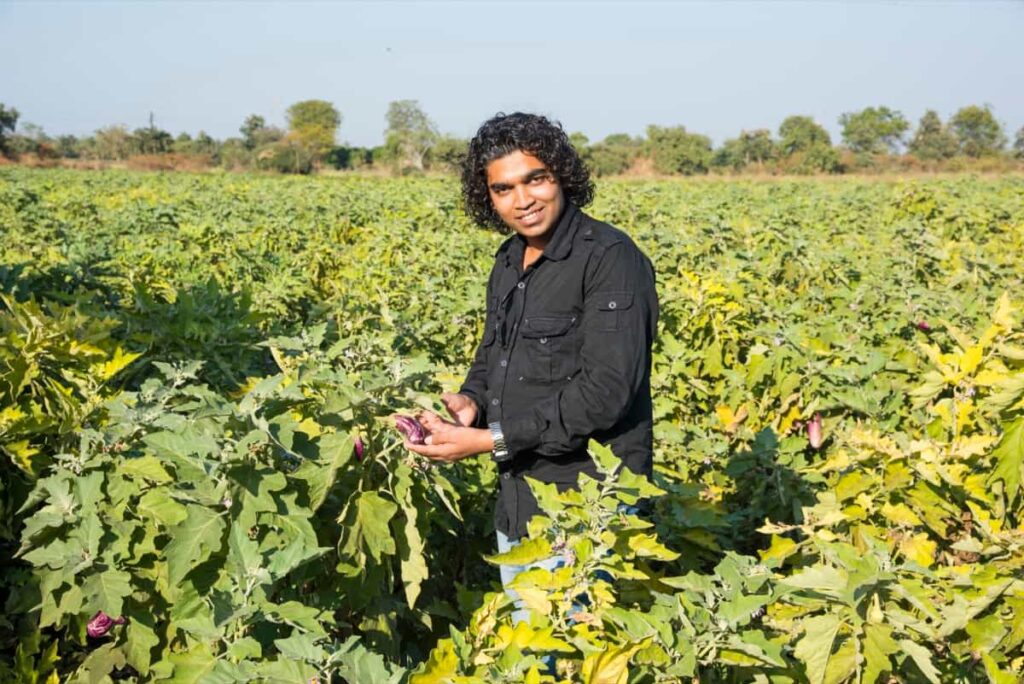
Among the vegetables promoted are Greens, Eggplant, Cabbage, Lady’s Finger, and Cabbage. Approximately 76,000 acres (about 30,850 hectares) are targeted for this year, while one lakh (about 40,470 hectares) is targeted for next year. According to one estimate, there are approximately 65,610 acres (approximately 26,650 hectares) under organic farming in Tamil Nadu. Nilgiris (1,287 hectares), Dindigul (55 hectares), Namakkal (49 hectares), Coimbatore (77 hectares), and Tiruppur (47 hectares) are the top five organic vegetable-growing districts in Tamil Nadu.
| Vegetable | Areas growing | Organic yield per acre | Crop duration |
| Drumsticks | Thoothukudi Dindigul Karur | 5-9 tons | 8-9 months |
| Tomato | Coimbatore Dharmapuri Salem Krishnagiri | 40-45 tons | 140-145 days |
| Onion | Perambalur Tiruchirapalli Namakkal Dindidul | 12-14 tons | 80-150 days |
| Cabbage | Nilgiris Krishnagiri Dindigul | 10-14 tons | 90-120 days |
| Brinjal | Vellore Kanchipuram Theni Coimbatore | 16-18 tons | 140-150 days |
| Potato | Nilgiris Dindigul | 10-12 tons | 75-120 days |
| Gaurds | Namakkal Salem Dharmapuri | 10-12 tons | 55-75 days |
| Bhendi | Kanchipuram Vellore Dindigul | 5-7 tons | 45-60 days |
Organic herbs farming in Tamilnadu
The state government is encouraging the cultivation of medicinal plants by motivating farmers, traders, and entrepreneurs. Medicinal plants are cultivated on 12,000 to 25,000 acres in the state. The plants are cultivated in Villupuram, Tiruvannamalai, Dindigul, Karur, Namakkal, Tuticorin, and Tirunelveli. Not much cultivation is taking place in the Coimbatore region. Farmers can take up medicinal plant cultivation in dry and arid lands.
The returns are handsome, while not much investment is required. A phytopharmaceutical mission was launched in Tamil Nadu by the Central Institute for Medicinal and Aromatic Plants (CIMAP) through the Tamil Nadu Agricultural University. Its main aim is to encourage more farmers to grow crops like vetiver, lemongrass, palmarosa, and satavar, among others. In addition, the state government is encouraging a few entrepreneurs, including one in Ooty and another in Coimbatore, for specifically geranium and rose oil extraction.
There is a huge demand for ashwagandha in the international market as it helps to cure several health problems. Plants such as senna, coleus, nithya kalyani, tulsi, and aloe vera also have takers. Farmers can also consider vetiver and lemongrass. Some of the areas identified are Marayoor near Munnar, where lemongrass is cultivated, and Vellimudi and Mavadaippu near Valparai. In addition, a small cluster of farmers in Cuddalore cultivate vettiver and extract the essential oil.
Organic fruit farming in Tamilnadu
To increase farmers’ production, productivity, and income, various schemes are being implemented through the Department of Horticulture and Plantation crops. To impart hi-tech production techniques among farmers, various schemes like poly house construction, shade net house, mulching, and distribution of seedlings of high-yielding fruit crops, vegetables, and plantation crops are being done.
In case you missed it: Humic Acid Fertilizer Uses: Role, Application Methods, Dosage, and Benefits for Sustainable Agriculture
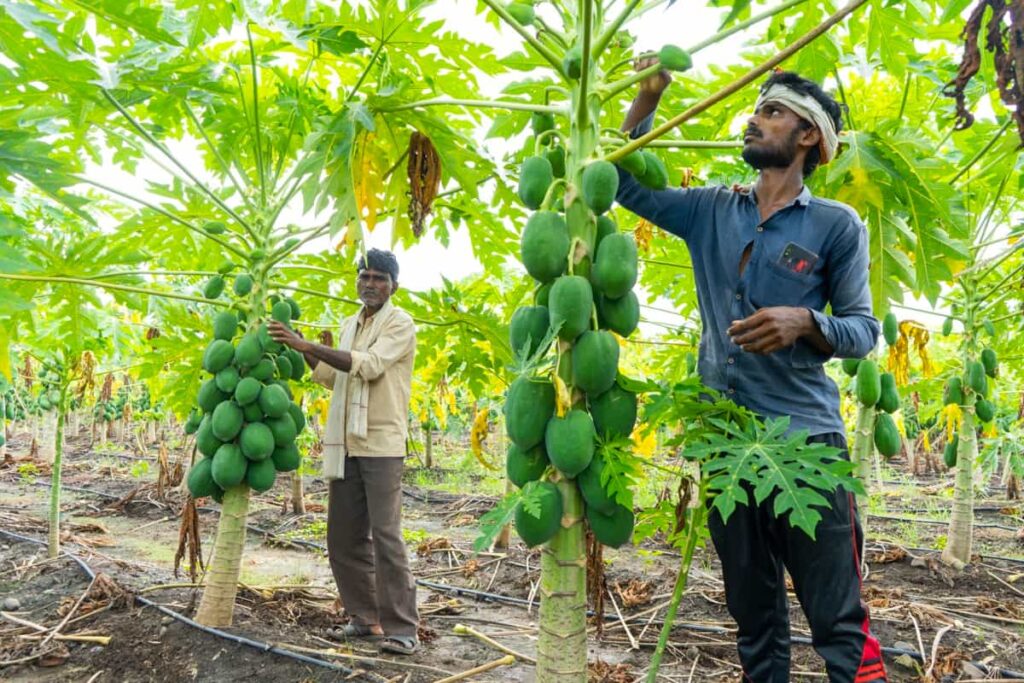
Under Pradhan Mantri Krishi Sinchayee Yojana (PMKSY) scheme, to emphasize the efficient use of irrigation water, farmers are encouraged to set up micro-irrigation facilities through the financial assistance of 100 % subsidy to small and marginal farmers and 75 % subsidy to big farmers. A beneficiary can get financial assistance up to 5 ha. Farmers who are already benefited can also get a subsidy for renewing the laterals after seven years.
| Name of the Crop | Area(Ha) | Major Fruit Growing Districts |
| Mango | 3,78,371 | Krishnagiri Dharmapuri Dindigul Vellore Tiruvallur |
| Banana | 2,04,927 | Erode Thoothukudi Dindigul Coimbatore Kanyakumari |
| Lemon | 23,937 | Dindigul Tirunelveli Theni Thoothukudi Virudhunagar |
| Guava | 24,034 | Dindigul Madurai Vellore Virudhunagar Cuddalore |
| Water Melon | 22,556 | Kancheepuram Viluppuram Thiruvallur Thiruvannamalai Erode |
| Amla | 18,439 | Dindigul Thirunelveli Tiruppur Sivagangai Theni |
| Sapota | 14,287 | Dindigul Vellore Virudhunagar Thirunelveli Theni |
| Jack fruit | 5,880 | Cuddalore Dindigul Kanyakumari Namakkal Pudukkottai |
| Grapes | 5,357 | Theni Dindigul Coimbatore |
| Papaya | 3,782 | Dharmapuri Erode Vellore |
Organic millet farming in Tamilnadu
The Tamil Nadu Millet Mission will establish two special millet zones to increase production. Tiruvannamalai, Salem, Kallakurichi, Villupuram, Cuddalore, Dharmapuri, Krishnagiri, and Vellore are in one zone. In contrast, Thoothukudi, Virudhunagar, Madurai, Tenkasi, Ramnathapuram, Sivagangai, Theni, Trichy, Karur, DindigulAriyalurand Perambalura are included in the second zone.
In case you missed it: Growing Pearl Millet/Bajra Organically in Rajasthan: Step-by-Step Farming Practices and Production
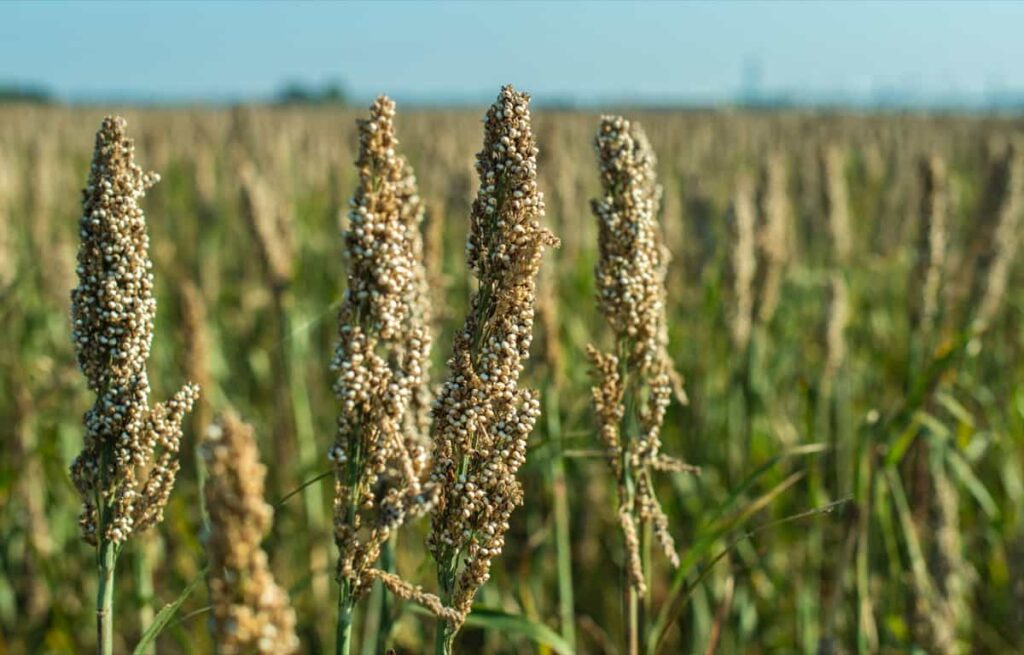
The Tamil Nadu State Rural Livelihood Mission will provide Rs 1 crore to 500 marginal farmers to promote the production and consumption of millet. There will be a total allocation of Rs.92 crore from the Union and State Governments for implementing this scheme. Farmers will be encouraged to market products with value-added through cultivation assistance. To achieve self-sufficiency in pulse production, a Special Redgram Zone will be formed in Krishnagiri, Dharmapuri, Tiruvannamalai, and Salem.
| Millets | Areas growing in Tamilnadu |
| Cholam (Jowar/Sorghum) | Dharmapuri Salem Virudhunagar Namakkal Tiruchirapalli Dindigul Theni Karur Madurai Trichy Kanchipuram Cuddalore Erode Pudhukottai Ramanadhapuram Vellore |
| Cumbu (Pearl millet) | Virudhunagar Kallakurichi Villupuram Thiruvannamalai Cuddalore Thoothukudi Ariyalur Tiruppatur |
| Ragi (Finger millet) | Krishnagiri Dharmapuri Salem Thiruvannamalai Erode Vellore Villupuram Virudhunagar |
| Varagu (Kodo millet) | Vellore Thiruvannamalai Kanchipuram Tiruvallur Dharmapuri Krishnagiri Salem Namakkal Cuddalore Villupuram Tiruchirapalli Perambalur Karur Thanjavur Tiruvarur Nagapattinam Madurai Dindigul Theni Ramanathapuram |
| Samai (Little millet) | Dharmapuri Vellore Tiruvannamalai Erode Salem Namakkal Coimbatore Madurai Dindigul Theni Tirunelveli Thoothukudi |
| Pani varaghu (Proso millet) | Tiruvannamala Salem Namakkal Dharmapuri Krishnagiri Madurai Dindigul Theni Tirunelveli Thoothukudi |
| Thenai (Foxtail millet) | Dharmapuri Krishnagiri Vellore Tiruvannamalai Cuddalore Villupuram Salem Namakkal Erode Coimbatore Tiruchirapalli Perambalur Karur Madurai Theni Tirunelveli Thoothukudi |
| Kudhiraivali (Banyard millet) | Salem Namakkal Dharmapuri Krishnagiri Coimbatore Tiruchirapalli Perambalur Karur Pudukottai Madurai Dindigul Theni Ramanathanpuram Tirunelveli Thoothukudi |
Organic livestock farming in Tamilnadu
In rural and urban areas, animal husbandry contributes significantly to the income of small, marginal farmers and landless laborers. It generates gainful employment opportunities, particularly self-employment, for many people who care for and manage livestock. Furthermore, it provides nutritious, protein-rich, balanced food in milk, eggs, meat, and value-added products.
Additionally, they are intricately linked to the region’s social, cultural, and traditional values. Providing veterinary health care to livestock and poultry reared in the state and improving their genetic production potential are major functions of the Animal Husbandry Department. Additionally, the poor, downtrodden, and weaker sections of society are being provided with various beneficiary-specific schemes for economic upliftment.
In case you missed it: The Benefits of Incorporating Organic Practices in Vegetable Cultivation
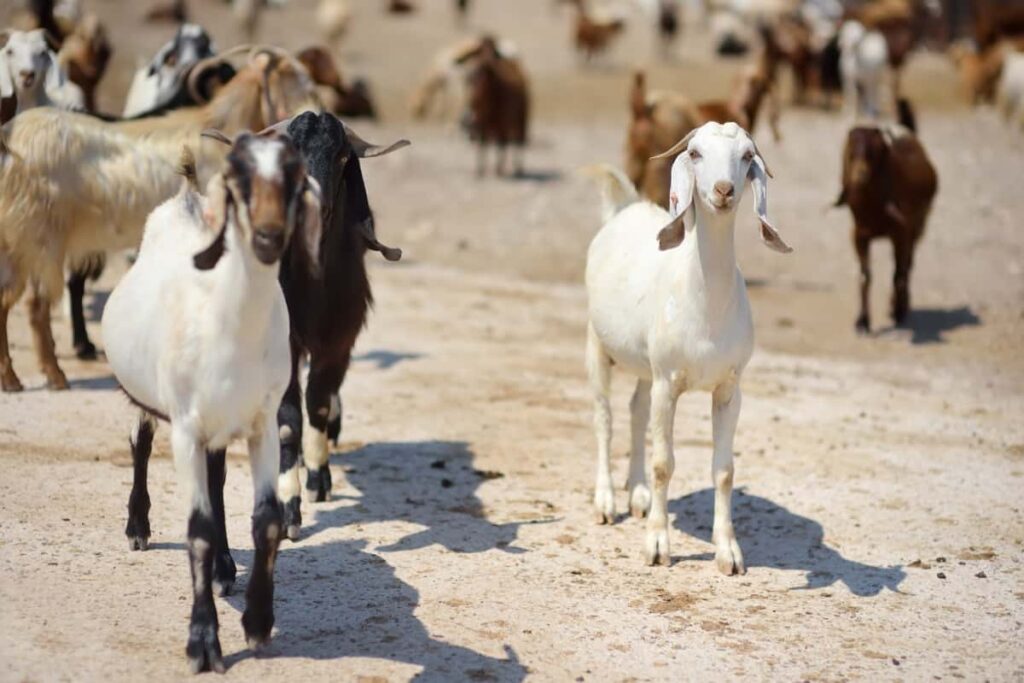
Several veterinary institutions provide these services throughout the state. Through the dedicated and sustained efforts of the department, the livestock sector of the state has been elevated to a prominent position with beneficiary-oriented programs and the eco-balanced utilization of natural resources.
- Kanni adu is the recognized goat breed of Tamilnadu. Kanni adu is mainly found in south Tamilnadu. This goat breed is mainly seen in virudhu nagar, Thoothukudi, and Tirunelveli cities of Tamilnadu.
- Sheep breeds- distributed areas
| Sheep breed | Areas in Tamilnadu |
| Mecheri | Salem Erode Karur Namakkal fewer parts of the Dharmapuri districts |
| Chennai red | Chennai Kancheepuram Villupuram Thiruvannamalai |
| Ramanadhapuram white | Ramanadhapuram Sivagangai Virudhunagar |
| Keezhakaraisal | Ramanadhapuram Sivagangai Thirunelveli |
| Vembur | Vembur Melakarandhai Keezha karandhai Nagalapuram regions Tuticorin Virudhunagar |
| Trichy black | Neelagiri Trichy Perambalur Dharmapuri Salem |
- The Tamil Nadu government plans to promote poultry clusters in the state’s seven backward and non-poultry regions. Namakkal, in southern Tamil Nadu, is the largest egg-exporting hub of the country. The state occupies the second position in egg production in the country.
- Currently, most poultry farming has been developed commercially in the western parts of the state, with Namakkal developing as a layered belt and the Palladam region developing into a broiler hub.
Organic aquaculture farming in Tamilnadu
In recent years, fishing has become an important sector of the state’s food production, providing livelihoods and food security to many people. Since the early fifties, fishing has evolved from a traditional livelihood activity into a commercial enterprise that contributes significantly to the state and national economies, livelihoods, nutrition, rural employment, and foreign exchange earnings.
In case you missed it: Chicken Farming in Indonesia: Poultry Business Plan, Setup Cost, License, Profit, and Requirements

As one of India’s foremost states, Tamil Nadu has shown steady growth in fish production and optimum resource utilization. Furthermore, Tamil Nadu has pioneered several innovative welfare and development programs. There are abundant natural resources in the coastal areas of Tamil Nadu, which make it one of the most attractive places for coastal aqua farming in the country.
According to estimates, Tamil Nadu has about 56,000 ha of brackish water area under capture fisheries and 6115.68 ha under coastal aquaculture production, primarily shrimp aquaculture. Furthermore, introducing a Specific Pathogen Free (SPF) Shrimp, Litopenaeus vannamei, has made shrimp farming in Tamil Nadu a major commercial activity. As a result, 1,859 shrimp farms (3,712.02 ha.) and 63 shrimp hatcheries have been registered with the Coastal Aquaculture Authority (CAA).
Therefore, land-based coastal aquaculture has a lot of potential in Tamil Nadu. Tamilnadu has small lobster and crab resources of high commercial value, making it one of the top states in India. A total of 700 tonnes is harvested annually, of which nearly 50% are juveniles between 50 and 250 grams. The shellfish resources of Tamilnadu include mussels and oysters. Tamilnadu is home to a large population of Green Mussel Pernaviridis.
Open seas and estuaries free from strong wave action are ideal for idle mussel culture. Among bivalve resources, clams are the most important. The Meretrixcasta, M.Meretrix, and Anadaragranosa are commercially exploited and cultivable clams. In the east coast estuaries of Pulicat lake, Vellar lake, Athankarai lake, and Punnakayal lake, there are abundant beds of clams. The demand for clam meat and adductor mussles of giant clams is high
It is found in the Gulf of Mannar and Palk Bay, where Pearl Oysters (Pinctadasp) can be found. Tamil Nadu is home to six species of Pearl Oysters. As a result, the Tuticorin Coast in Tamilnadu is ideal for farming Pearl Oysters. This farming technology can use raft culture, rack culture, or a longline culture.
How to get organic certification in Tamilnadu
Tamil Nadu Organic Certification Department (TNOCD) aims to create an ecosystem that can achieve sustainable productivity without using artificial external inputs such as agrochemicals, fertilizers, and pesticides. The Government of Tamilnadu established TNOCD in 2007 to inspect and certify the organic production system under NPOP (National Programme for Organic Production).
It was launched by the Government of India in 2000 and notified in October 2001 under the Foreign Trade and Development Act (FT D&R Act). As part of the National Programme for Organic Production (NPOP), Tamilnadu Organic Certification Department certifies agricultural organic crops for production, processing, and trade. This department carries out organic certifications that are recognized internationally and meet the European Union’s standards, as well as the Swiss Organic Farming Ordinance, et0063.
In case you missed it: Top 15 Agritech Startups Helping Farmers in India: Smart Farming for High Yields and Low Pests and Disease
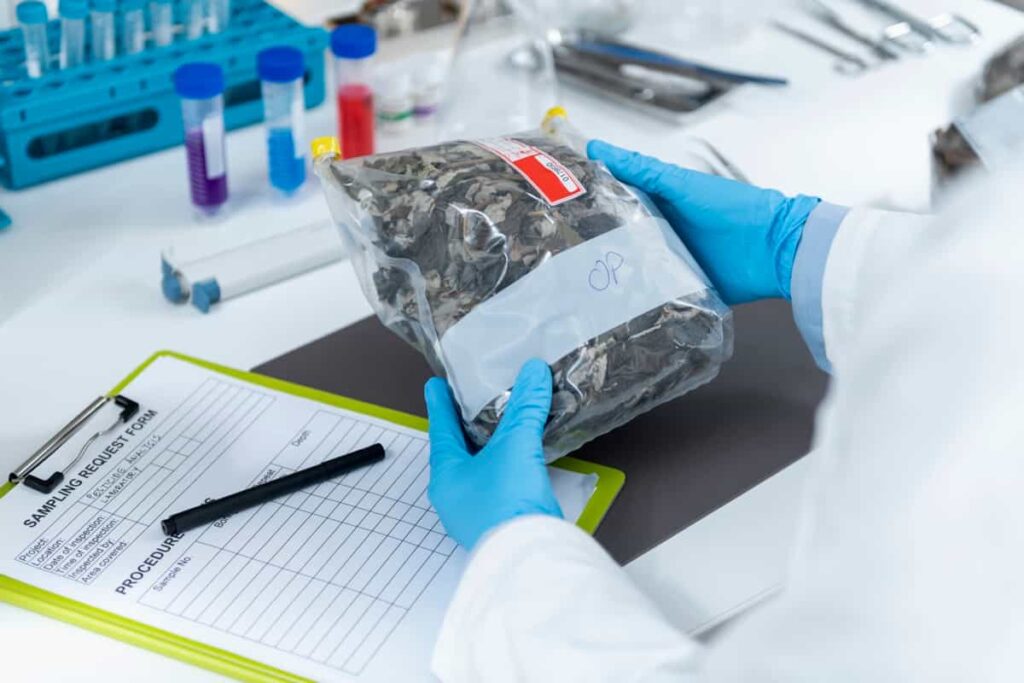
As part of its organic certification program, the Tamil Nadu Organic Certification Department also conducts free training for registered organic farmers on the National Standards for Organic production. In Tamil Nadu, 4768 farmers registered 31687 acres of land under organic certification during 2018-19.
- Organic farming certificates must be obtained by conforming to the standards laid out by the National Programme for Organic Production (NPOP) for organic crop production.
- Applicants must submit their applications and pay the fee under the National Programme for Organic Production (NPOP).
- Applicants must provide all the information requested by the Tamil Nadu Organic Certification Department (TNOCD) in the application, including name, address, contact details, field location, and group information.
- Prepare, implement and update the organic production plan of the product annually and submit it to TNOCD every year.
- The requested person should pay the prescribed registration fee, field inspection fee, one-time travel cost, and the application form.
- The quality system manager will inspect the field and see if the product is produced under the norms and documents as soon as the application is submitted.
- The field inspector prepares a report. A reviewing body reviews this.
- If the Organic product does not comply with the Standards, the requestor shall be intimated about the denial of certification, stating the reasons for such action with non-conformities noticed and the time limit for submission of correction
- Upon receipt of such reports, the person shall correct the non-compliance and submit the action taken report to the TNOCD.
- TNOCD shall ensure the correction is carried out before issuing the certificate.
- Suppose the applicant wishes to come under TNOCD certification for their product. In that case, they must submit a new application form and a notification of non-conformities issued by their previous certification body.
- Once the product certificate is given, the product comes with the “India Organic “logo.
Conclusion
Tamil Nadu’s organic farming industry is gaining traction among farmers, producers, traders, exporters, processors, and consumers. Scientists, agronomists, and farmers in Tamil Nadu are working together to promote organic farming.
Furthermore, numerous public and private agencies advocate organic farming in major crops, including NGOs, the State Department of Agriculture, and the Tamil Nadu Agricultural University. In case, if you are planning for organic cultivation/farming/production in the following districts of Tamilnadu, this blog post will help you understand the concept of organic farming.
| Ariyalur | Ramanathapuram |
| Chengalpet | Ranipet |
| Chennai | Salem |
| Coimbatore | Sivagangai |
| Cuddalore | Tenkasi |
| Dharmapuri | Thanjavur |
| Dindigul | Theni |
| Erode | Thiruvallur |
| Kallakurichi | Thiruvarur |
| Kancheepuram | Tuticorin |
| Karur | Tiruchirappalli |
| Krishnagiri | Thirunelveli |
| Madurai | Tirupathur |
| Mayiladuthurai | Tiruppur |
| Nagapattinam | Tiruvannamalai |
| Kanyakumari | The Nilgiris |
| Namakkal | Vellore |
| Perambalur | Viluppuram |
| Pudukottai | Virudhunagar |
- Sheep Farming Business Plan for Beginners
- Aquaponic Farming at Home: A Step-By-Step Guide
- Profitable Village Farming Business Ideas in 2024
- High-Yield Aquaculture: Fast-Growing Fish for Farming
- Effective Fish Pond Construction Techniques for Beginners
- Irrigation and Water Management in Pineapple Farming
- Blossom to Harvest: Mastering Flowering and Pollination in Papaya Farming
- Pig Fattening Essentials: From Selection to Sale for Beginners
- Raising Wagyu Cattle: A Complete Guide for Premium Beef Production
- Soil Types and Their Water Holding Capacity
- Optimizing Irrigation Schedules for Coconut Groves for Enhanced Yield
- Espresso Your Garden: Coffee Grounds for Healthier Acid-Loving Plants
- The Best Soil Mix for Snake Plants: How to Mix Your Own Snake Plant Soil
- Green Thumb Success: Expert Tips for Cultivating Greenhouse Beans All Year Round
- Bloom All Year Round: The Ultimate Guide to Indoor Hyacinth Care
- Eco-Friendly Gardening: How to Make Liquid Fertilizer from Kitchen Waste
- Ultimate Guide to Grow Anise in Pots: Explore Seed Propagation to Harvesting
- Guide to Raising Chester White Pigs: Discover Breed Facts to Growth Management
- Mastering the Elegance: The Ultimate Guide to Weeping Cherry Tree Care, Planting, and Maintenance
- Ultimate Guide to Planting Garlic in Grow Bags: Growing Strategies for Beginners
- How to Fix Spider Plant Leaf-Related Problems: Natural and Organic Remedies
- 10 Reasons Why Your Tulsi Plant is Shedding Leaves: Home Remedies and Solutions
- Optimizing Growth and Yield: The Advantages of Palm Bunch Ash Fertilizer
- Utilizing Neem Oil Extract as a Natural Pesticide for Hydrangea
- From Soil to Harvest: Various Ways in Which Farmers Can Use AI Tools
- Steps to Encourage and Induce Citrus Flowers: A Comprehensive Guide
- How to Fix Snake Plant Leaf-Related Issues: Natural and Organic Remedies
- Transform Your Garden into a Fragrant Oasis with Raat Ki Rani (Night Blooming Jasmine)
- Discover the Ideal Chicken Breeds for Philippine Farms
- How to Create a Poultry Egg Farm Business Plan for Profits
- Grow Lemon Cucumbers Like a Pro: Insider Techniques for Bountiful Yields
- Ultimate Guide to Caring for Your Pink Princess Philodendron: Tips for Thriving Variegation
- Areca Nut Profit Per Acre: Calculating Yield and Cost of Cultivation
- How Kaveri Chicken is Becoming a More Profitable Breed in Indian Backyards
- Transform Your Barn: 9 Steps to Convert a Horse Stall into a Chicken Coop
- Exploring Suffolk Sheep Disadvantages with Limitations and Challenges
